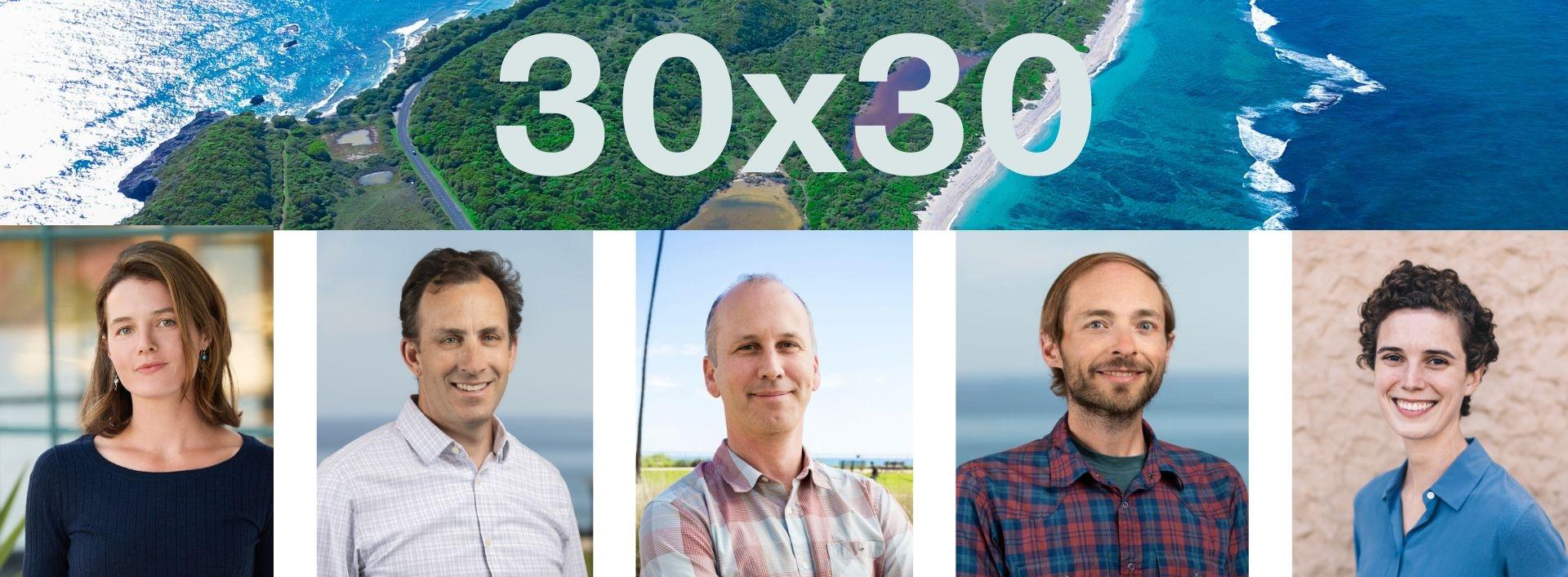Panel Discussion: What 30x30 Means for Conservation on Land and at Sea

The 30x30 initiative calls for protecting 30% of the Earth’s land, inland waters, and coastal and marine areas by 2030. An unprecedentedly bold vision for the future, 30x30 has reshaped conservation policy. At COP15 in December 2022, more than 190 countries committed to achieving this global goal by adopting the Kunming-Montreal Global Biodiversity Framework. President Biden and Governor Newsom have independently issued executive orders to establish 30x30 as the goal for the United States and California, respectively. Yet many questions remain about how to successfully implement this vision equitability. This panel will bring together experts across UCSB to discuss the future of 30x30.
PANELISTS
Millie Chapman, Postdoc, NCEAS; Visiting Faculty Researcher, Google. Millie received her PhD from the University of California Berkeley in the department of Environmental Science, Policy, and Management (ESPM). She will be moving to Switzerland this summer to join ETH Zürich as a faculty member in the Department of Environmental Systems Science. Her research is at the intersection of decision theory, ecology, and data justice, asking how we can develop more effective and equitable strategies to meet global biodiversity targets in an age of AI.
Chris Costello, Distinguished Professor, Bren School; Director, emLab. While there is broad agreement that resources are valuable and need to be used wisely and sustainably, there is less agreement on the definitions of such terms as “wisely” and “sustainable,” meanings that evolve within the context of identifying society’s objectives and creating the mechanisms and policies to achieve them. Professor Costello works in this area, focusing on the economics of environmental regulation and natural-resource management under conditions of uncertainty (inaccurate, unavailable, or contradictory information), with a particular emphasis on the value and effect of information on management decisions. Correlate to this is his interest in adaptive-management programs that have a learning component intended to resolve uncertainty. He has applied this perspective to studies in biological diversity, introduced species, regulation of polluting industries, and marine policy.
Ben Halpern, Professor, Bren School; Director, NCEAS. Ben Halpern focuses his research at the interface of marine ecology and conservation planning. His research has addressed a broad range of questions that span local to global scales, including spatial population dynamics, trophic interactions in community ecology, and the interface between ecology and human dynamics, all with the ultimate aim of informing and facilitating conservation and resource management efforts in marine systems. After receiving his PhD in 2003, he held a joint post-doctoral fellowship at the National Center for Ecological Analysis and Synthesis (NCEAS) and the Smith Fellowship Program sponsored by The Nature Conservancy. He was a research associate at NCEAS until 2013 and then appointed professor at the Bren School, and served as part-time Chair in Marine Conservation at Imperial College in London from 2013-2018.
Gavin McDonald, Senior Project Scientist, emLab. Gavin began his career as a mechanical engineer and holds both a Bachelor's and Master's degree in Mechanical Engineering from Georgia Tech, along with a Master Professionnel from École Nationale Supérieure d'Arts et Métiers (ENSAM) in Metz, France. After three years working as a Research Engineer at the satellite research and development company Busek, he decided to go back to school to follow his lifelong passion for the environment. Gavin received a Master of Environmental Science and Management from the Bren School in 2013. Since graduating from Bren, he has worked at emLab (formerly Sustainable Fisheries Group) and focuses on using data to better understand and address global environmental and social challenges. The tools he uses include bioeconomic fisheries forecasting modeling, data-limited small-scale fisheries assessment and management, program impact evaluation and econometrics, decision support tool web app development, and big data and machine learning. Gavin is a PADI Divemaster and AAUS Scientific Diver and also enjoys cycling, trail running, backpacking, bikepacking, reading, and cooking with local sustainable food.
Moderated by Ruth Oliver, Assistant Professor, Bren School. Ruth's research focuses on developing methodologies and leveraging emerging technologies to harness the power of big data to gain new ecological insights and create global biodiversity metrics that can inform policy choices. Ruth's current work employs automated biodiversity sensors, such as camera traps, audio recorders, and tracking devices, to understand how wildlife respond to anthropogenic change. Ruth joined the Bren School from Yale University, where she was an Associate Research Scientist at the Center for Biodiversity and Global Change. She holds a bachelor's degree in Physics from Claremont McKenna College and a PhD in Earth and Environmental Science from Columbia University.